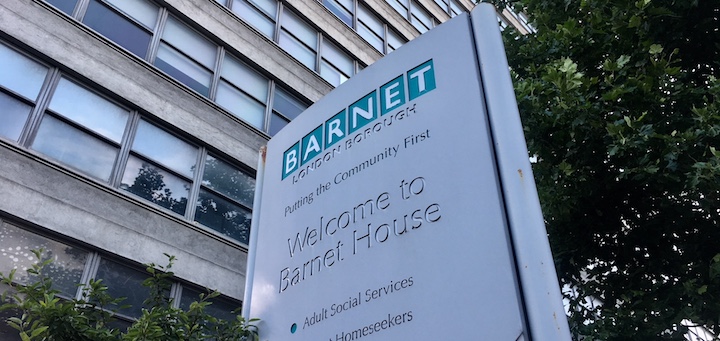
Barnet has signalled its outsourcing revolution is being reduced. But is this the return of council provision?
Internal reviews are rarely news but the announcement by London Borough of Barnet that it was reassessing its outsourcing deal and bringing key services back inhouse was a major moment.
The decision by councillors, which was not widely publicised, was that “the director of place role and the skills, employment and economic development (SEED) team from within the regeneration service, and the safety, health and wellbeing (SHaW) service, be returned to the council, subject to completion of the necessary financial due diligence.”
Added to this, the council will decide in the autumn the future contractual arrangements with Capita for staff involved in the management and governance of the Brent Cross Cricklewood development scheme.
Finance and Strategic HR had already transferred back to Barnet Council from Capita in April and the firm has already paid more than £4m in compensation.
It is a far cry from the bold announcement of One Barnet, the giant outsourcing partnership started in 2013 with Capita.
The £322m contract was trumpeted as planned to run for a decade and deliver multi-million-pound savings.
Dubbed ‘Easy Council’, Barnet’s ambition was to become a contract manager driving cost-savings for residents through low council tax.
The model found supporters including then-communities secretary Eric Pickles who believed this was the new model of councils for the future.
The past year has not been great for the outsourcing market; the biggest challenge being the collapse of construction firm Carillion. Birmingham City Council announced last week that it had finally exited a 25-year outsourcing deal. So is this the start of contracts coming home?
Barnet revealed problems, particularly in IT, HR and estates services, in 2016.
A report to councillors said: “Not surprisingly with a contract of this scale and complexity, there have been performance challenges in all services, some of which have been significant.”
In the early years of austerity, outsourcing was seen as a way of delivering modern services and council functions with reduced costs.
Cornwall, Isle of Wight, Birmingham and many others signed deals covering IT, roads, HR and more.
Critics warned the contracts locked in budgets for the long term with little flexibility and tendering was subject to suicide bidding where firms deliberately under-bid in order to win the contract with the aim of recovering costs later.
Countering this, local authority staff improved their training in procurement and began driving a hard bargain – a factor in the collapse of Carillion which the NAO estimates has cost the taxpayer an estimated £148m.
Another big player in outsourcing, Interserve, revealed in December last year it was seeking a rescue package after contracts were cancelled and problems with two energy to waste projects intensified.
Official investigations have questioned the procurement processes involved. MPs on the public accounts committee condemned a ‘merry-go-round’ culture that encouraged companies to bid for contracts undeliverable at agreed price.
Committee chair Meg Hillier said: “We have identified a need for government to be more assertive in shaping the markets in which it operates, with a renewed focus on driving value for taxpayers’ money.
“It must look with fresh eyes at the motivations of companies currently bidding for central government work, and develop a strategy that requires contract-awarding bodies to look beyond bottom-line costs.”
Could simply bringing all works back into council control be the answer?
Despite the myth, councils have always used contractors to provide services even at the height of municipality in the 1970s.
Birmingham admitted it still needs to work with the private sector to provide highways maintenance.
The joint statement issued with Amey revealed the council is going back to basics with a new contractor and will work with existing teams in the meantime.
It said: “As part of the agreement, Amey will continue to provide services until a replacement contractor is found to deliver those services on an interim basis. That interim replacement will be sought as soon as possible but will be in place no later than 1st April 2020.
The full re-tendering of the project to find a permanent replacement contractor will take place during 2020/21. All parties will be working closely in the coming months to ensure the smooth transition of services and staff.”
Based on the pull-backs by councils so far, the size of future contracts and timescales are likely to be reduced with more services being brought back into local authorities. But the driver will be cost-effectiveness rather than service innovation or ideology.
Barnet claimed the issues it is dealing with in the highways part of the deal “are no more likely to be resolved through the service being insourced, than they are through jointly strengthening the performance management arrangements.
It is recruiting a new director and has promised tougher scrutiny of contract performance.
Capita will still run 17 services for the council including revenue and benefits, planning applications, IT and customer services.
Barnet Council leader Dan Thomas, said in a statement: “The clear message from our residents is that they want good quality services. They also want services that are efficient and represent value for money.”
“Our past experiences have taught us that the work required to alter complex contracts, is significant. This is not something the council can enter into lightly, and there must be a compelling business case. We will do that when clearly there is a case – and most importantly, we know that it will enhance service delivery.”
Joanne Pitt, CIPFA’s local government policy manager, told Room151 that councils are being driven by their obligation to achieve value-for-money: “Irrespective of which bodies deliver public services, it’s important that councils continue to review available options and use their resources effectively and in the best interests of their citizens.”













